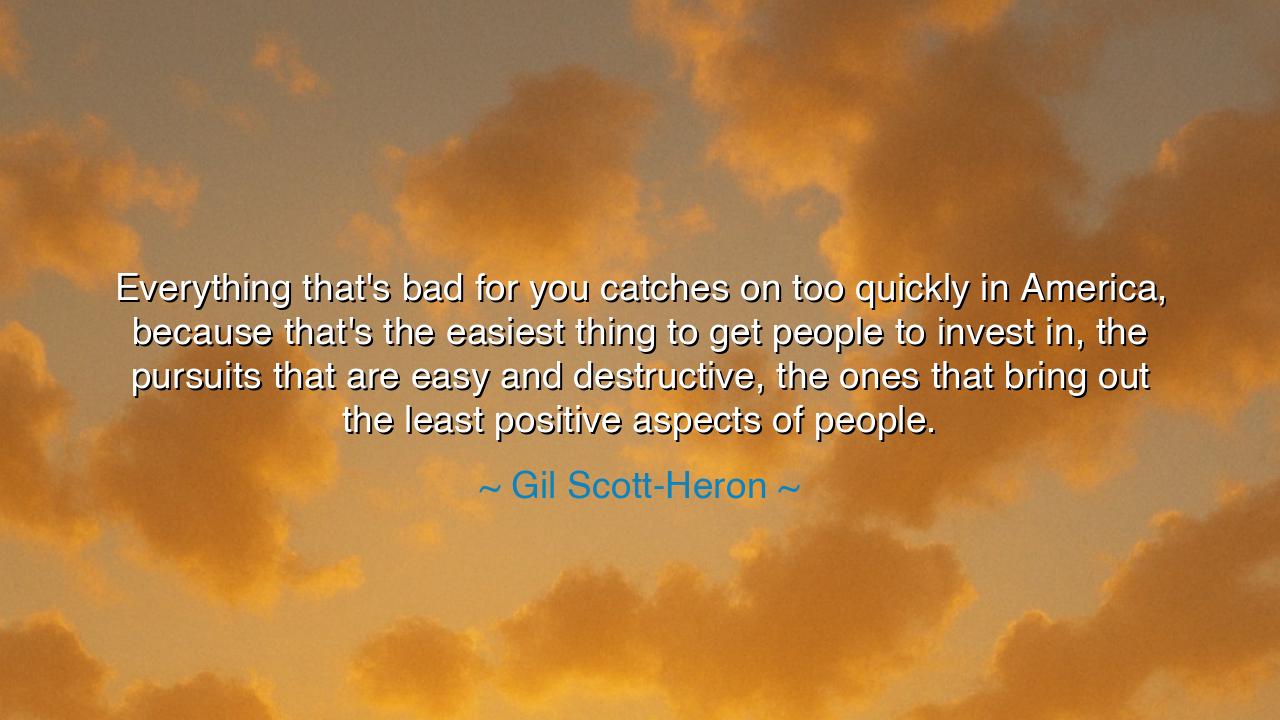
Everything that's bad for you catches on too quickly in America
Everything that's bad for you catches on too quickly in America, because that's the easiest thing to get people to invest in, the pursuits that are easy and destructive, the ones that bring out the least positive aspects of people.






Hear the voice of Gil Scott-Heron, poet of truth and prophet of rhythm, who declared: “Everything that's bad for you catches on too quickly in America, because that's the easiest thing to get people to invest in, the pursuits that are easy and destructive, the ones that bring out the least positive aspects of people.” In this saying lies not only social criticism, but the sorrow of a seer who watched his nation choose quick pleasure over deep purpose, profit over principle, destruction over creation. It is a warning, thunderous and unyielding, that the path of least resistance often leads to ruin.
The meaning of his words is that destruction is easy. To sell violence, indulgence, and despair requires little effort, for these things appeal to the basest instincts of humankind. To market fast food, addictive entertainment, shallow celebrity, or weapons of war is simple, for they promise instant gratification. But to build schools, to invest in the arts, to cultivate wisdom, to inspire love—these require patience, sacrifice, and vision. Thus, the bad spreads swiftly, because it is cheap to create and easy to consume, while the good struggles, for it asks more of us.
History bears witness to this truth. Consider the rise of tobacco in America. For centuries it was glorified, wrapped in glamour, sold with images of health and strength, even though it silently killed millions. Corporations profited, citizens indulged, and the truth was buried under smoke. Why? Because destruction was easy to sell, and restraint was hard. Here we see Gil Scott-Heron’s wisdom: the destructive caught on too quickly, not because people were wicked, but because the lure of ease was stronger than the call of discipline.
The origin of these words lies in Scott-Heron’s own life as a critic of culture and politics. Known as the “Godfather of Rap,” he wielded spoken word and music as weapons against apathy. He saw how corporate powers and governments profited from division, distraction, and despair. He saw how systems made it easier to consume poisons of body and soul than to access the nourishment of education, justice, and equality. His words were not merely personal opinion—they were testimony, born of living through the cycles of exploitation he condemned.
And yet, this is not merely about America—it is about the human heart. For every person faces the temptation of the easy path. It is easier to mock than to encourage, easier to consume than to create, easier to surrender to despair than to fight for hope. But the easy way is rarely the noble way. The call of Gil Scott-Heron is for vigilance: to recognize that what catches fire quickly is often what burns us in the end. The pursuits that uplift the soul require work, but they bring forth lasting fruit.
The lesson for us is clear: guard yourself against what is easy and destructive. Ask not what is popular, but what is right. Resist the seduction of quick indulgence, and instead invest in pursuits that nourish—learning, compassion, justice, creativity. Be mindful of what you consume, not only with the body but with the mind. Every dollar you spend, every word you amplify, every habit you choose either strengthens the destructive or uplifts the constructive.
So I say unto you: take Gil Scott-Heron’s words as a warning and a call to arms. Do not allow the world to shape you through the lure of the easy. Instead, shape the world by choosing the hard but fruitful path. Celebrate what is noble, even when it is slow to spread. Build what lasts, even when it requires sacrifice. For though the destructive may catch on quickly, it is the constructive that endures, and those who choose it become the true builders of nations and the torchbearers for generations yet unborn.






TNPham Thi Nhung
I find this perspective thought-provoking and somewhat pessimistic. It prompts me to consider the consequences of valuing convenience and destructiveness over depth and integrity. Can cultural change realistically counteract the allure of easy but harmful pursuits? I wonder how individuals can cultivate awareness and resist societal pressures, and whether promoting positive alternatives could eventually shift collective behavior in a meaningful way.
DTChi Py De Thuong
This quote makes me think about the psychology behind why negative or harmful behaviors spread rapidly. Is it because they are easier to sensationalize, more exciting, or require less effort? I’m curious whether this pattern is unique to America or observable in other societies as well. It also raises questions about responsibility—do media, corporations, and governments have an obligation to steer people toward pursuits that bring out their best qualities?
NNNgoc Nhi
Reading this, I feel concerned about the impact of society prioritizing instant gratification over meaningful engagement. Could this observation explain trends in unhealthy habits, sensational media, and consumerism? I also wonder how much individual choice versus systemic influence plays a role. It sparks a broader reflection on how communities, educators, and policymakers might create environments that encourage investment in constructive, fulfilling activities instead of destructive ones.
MDPhuc Thich Man Do
This statement feels unsettling but insightful. I wonder if Gil Scott-Heron is critiquing American culture, media, or consumer behavior—or all three. Why do pursuits that are easy and destructive gain traction so quickly? It raises questions about how incentives, social influence, and marketing shape public behavior, and whether it’s possible to redirect attention toward pursuits that nurture positivity, creativity, and long-term well-being.